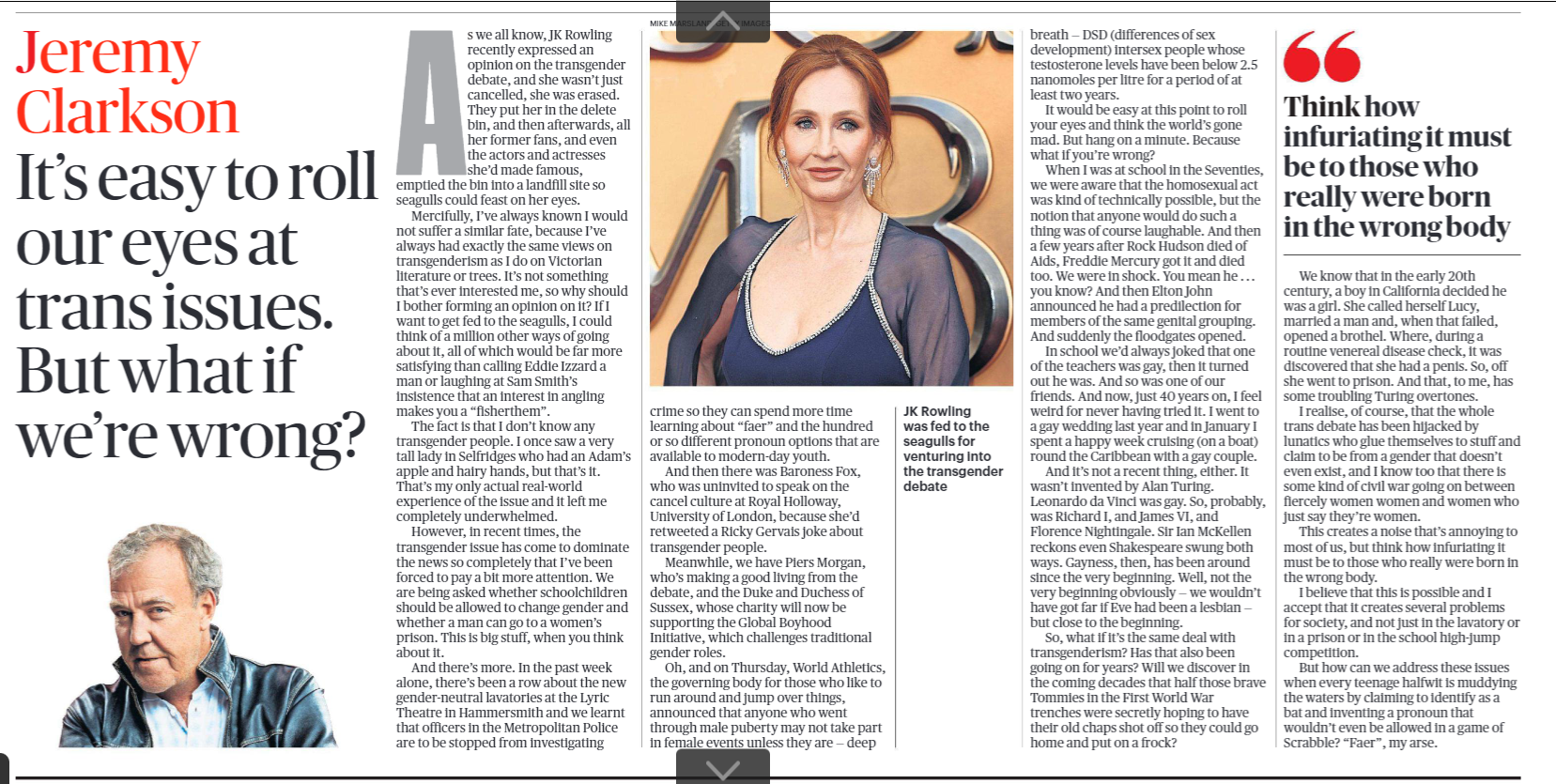In a recent Sunday Times column, Jeremy Clarkson discussed the prevalence of transgender issues in the news and admitted he doesn’t know any transgender people personally. Although he makes jokes and uses problematic language throughout the piece, he posed an important question: “What if you’re wrong?”

If Jeremy Clarkson had hoped to make a splash with his column in The Sunday Times this weekend, he surely didn’t anticipate the furore over Nazi Barbie getting covered in tomato sauce in New Zealand, nor the Wizard Author coming to her defence while spreading misinformation, some of which was quietly deleted without correction.
Despite the chaos, Clarkson managed to assemble some words in his column. The Sunday Times published it, even though it contained a few lines expressing sympathy for trans people. He even mentioned wishing he had had some homosexual experiences in his youth.
Barely anyone noticed for more than five minutes because of the chaos unfolding on the other side of the globe and the nonsense being spouted back in the UK to defend it.
I don’t read much Jeremy Clarkson. Why would I? The man is known for his arrogance and controversial statements. But, apparently, he’s quite likable on his farm show. Mostly, when it comes to minorities, Jeremy Clarkson is not a friend.
He’s the guy Brexit supporters love because he says what they want to say but don’t have the courage to, despite Clarkson actually writing an article arguing against Brexit.
So, it’s not surprising to see him writing in The Sunday Times or discussing transgender people. Nor was it shocking to see him making ridiculous jokes and dismissing young trans people. It wasn’t news to read that Clarkson has no grasp of queer history or understanding of trans people.
However, Clarkson surprised many by asking one simple question of those who rage against trans people: “What if you’re wrong?”
This seemingly small question jumped from the page for those who have watched the relentless tsunami of transphobic hate build over the past few years, fuelled by media outlets like The Sunday Times, The Times, The Telegraph, and the Mail. To see one of their prominent anti-woke correspondents just ask that simple question, “what if you’re wrong?” stood out.
Introspection isn’t really a strong suit for transphobes. Not that I’m saying Clarkson is transphobic, I don’t actually think he is. As he says in his own piece, he doesn’t know any trans people. He’s never met any trans people apart from one “very tall lady in Selfridges who had an Adam’s apple and hairy hands, but that’s it”.
He’s never knowingly spent any time with trans people, and he just doesn’t give a shit about the issue, which is where we find most people in the UK. In fact, he writes, “However, in recent times, the transgender issue has come to dominate the news so completely that I’ve been forced to pay a bit more attention.”
‘Forced’.
Clarkson’s article might not be most helpful for transphobes, but rather for people who are somewhat uncertain about the issue. These individuals don’t really understand the fuss or know what’s going on, and they may feel slightly uneasy about it.
Often, the news presents them with reasons to believe that it’s all a bit “off,” showcasing trans people as deviants, rude individuals, sex criminals, or those who force others to use specific language. Many times, the news is disingenuous, presenting the worst examples as representative of the entire community.
The phrase “what if we are wrong?” is not something you’ll typically hear from a transphobe. But for someone on the fringes of the movement who is open to considering this question, it could be eye-opening.
When you look past everything else Clarkson said, it’s not about applauding his honesty or giving him credit. The point is that the situation for the trans community is so dire that even a small ray of light can make a difference. Those four words open a crack.
We, as a community, may not have the platform, clout, or recognition to reach these uncertain individuals. Our voices are often drowned out by endless cisgender people discussing trans issues. But Clarkson has the power to reach them, and if those four words change even one person’s perspective, the ripple effect could be significant.










